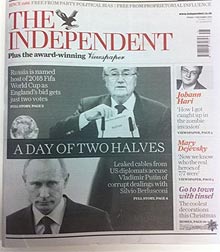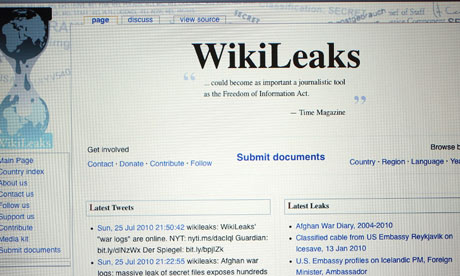12.43pm: Lebanon's al-Akhbar newspaper has an Arab world exclusive by getting its hands on a sizeable selection of Wikileaked state department cables from across the region, writes Ian Black, our Middle East editor.
How it got the material — much of it not yet released by anyone else — is a closely-guarded secret.el.
Al-Masry al-Youm, a respected Egyptian daily, also intended to run the cables - triggering nervousness in Cairo - but apparently came under pressure not to do so.
Interestingly, there is very little new in the Beirut documents about the 2005 murder of the former Lebanese prime minister, Rafiq al-Hariri, as expectations mount that a UN tribunal will shortly indict members of Hizbullah for the assassination.
Other key events are conspicuously absent.
Elias al-Murr, the defence minister, has come under attack for comments he reportedly made to US diplomats, and was forced to issue a statement that a Wikileaks cable was "incomplete and inaccurate."
It quoted him as telling the US ambassador that Hizbullah was "terrified of Israel."
Al-Akhbar accused him and other pro-western Lebanese politicians of acting like "informers." The paper also said the leaked documents proved the extent of the "politicization" of the UN's investigation into the Hariri assassination.
The Guardian's revelations about US spy flights over Lebanon are also big news in Beirut, not least because of the assumption that any intelligence about Hizbullah would automatically be passed to Isra
12.31pm: There's been some more interesting reaction on the Army Rumour Service, the site popular with squaddies, to the criticism of the British campaign in Afghanistan.
annoy_mous writes:Blokeonabike writes:
The comments about the British were justified. We didn't send enough troops out there because the British government, and British taxpayer, wouldn't pay for them. There weren't enough troops in Sangin to dominate the ground, so regular patrols weren't possible. The army hierarchy wouldn't / didn't acknowledge this and for several years carried on with the same tactics despite there obvious flaws.
Karzai and the Americans were right, US marines were needed to provide the extra manpower. I've read nothing to suggest that the lads themselves were anything other than professional. And hopefully now we are consolidating a position in central Helmand, we will be more effective.
The military "top brass" have, on several occasions and occasionally very publicly, noted that we do not have enough manpower/helicopters/light armoured vehicles etc. However, they, like the soldiers below them, are obliged to follow legal orders. The fact that they are given those orders by politicians with no military understanding does not make them any less legally binding. Given insufficient funding/equipment and political back-up, the British Forces at all levels have done the best they could be expected to do with the hand they have been dealt.
12.04pm: The Russian president Dmitry Medvedev, the man described as Robin to Vladimir Putin's Batman in one cable, has spoken out against US diplomats.
Speaking at a briefing with Italian Prime Minister Silvio Berlusconi in the southern Russian resort of Krasnaya Polyana, he said the cables showed the "cynicism" of US diplomacy.According to RIA Novosti he said:
We are not paranoid and we do not link Russian-American relations with any leaks, although the leaks are revealing. They show a full measure of cynicism of those evaluations and judgments that often prevail in the foreign policy of various states, in this case I am referring to the United States.
11.57am: This is useful: a full summary of today's WikiLeaks disclosures by my colleague Haroon Siddique. Down the right hand side of the article are links to previous day's disclosures.
11.40am: Der Spiegel has more on the German foreign minister Guido Westerwelle's chief of staff who admitted to passing secrets information to the Americans.
A worker at the party's headquarters who was chief of staff to the FDP chairman, German Foreign Minister Guido Westerwelle, came forward and admitted to being the source, an FDP party spokesperson said.Frankfturter Allgemeine names him as Helmut Metzner and says he has been relieved of his duties rather sacked. Does that mean he's been suspended?
Der Spiegel adds:
Helmut M. became chief of staff to the chairman of the party in Berlin after Westerwelle became Germany's foreign minister in a coalition government with Chancellor Angela Merkel's conservative Christian Democrats in 2009. During the coalition talks, Helmut M. had participated as a notetaker, FDP officials stated.
In a cable sent back to Washington that has been published online by WikiLeaks and cited by Spiegel, US Ambassador Philip Murphy described the worker as a "young, up-and-coming party loyalist." The cable states that during his meetings at the US Embassy in Berlin, he brought along internal papers from the coalition talks, including participant lists from working groups, schedules and handwritten notes. According to Spiegel information, they include, for example, information about an internal dispute over disarmament that took shape during the coalition negotiations.
11.31am: Another technical update on the WikiLeaks site, from Josh Halliday.
The Wikileaks.ch domain name, which only surfaced on Friday morning, is being served by the Swiss Pirate Party. And the routing to it is still being done by everydns.
11.22am: The WikiLeaks affair has claimed its first victim, according to the EU Observer. It reports that Germany's vice-chancellor Guido Westerwelle today sacked his chief of staff for spying for the Americans.
Westerwelle's chief of staff, Helmut Metzner, admitted that he gave regular information to the US embassy in Berlin, and has been "relieved from his duties," a spokesman for the Liberal Free Democrats (FDP) said in a statement.
11.12am: Julian Assange will be live on the Guardian's site from 1pm today to answer readers' questions. That's if he can get access to the internet. A big if at the moment.
10.57am: The Guardian's latest WikiLeaks story exposes more duplicity from the Foreign Office, this time over the plight of thousands of islanders expelled from Deigo Garcia to make way for a US military base.
Rob Evans and Richard Norton-Taylor report: Here's relevant cable.
More than 2,000 islanders – described privately by the Foreign Office as "Man Fridays" – were evicted from the British colony of Diego Garcia in the 1960s and 1970s. The Foreign Office, backed by the US, has fought a long legal battle to prevent them returning home.
The islanders' quest to go back will be decided by a ruling, expected shortly, from the European court of human rights.
New leaked documents show the Foreign Office has privately admitted its latest plan to declare the islands the world's largest marine protection zone will end any chance of them being repatriated.
The admission is at odds with public claims by Foreign Office ministers that the proposed park would have no effect on the islanders' right of return.
10.46am: Pentagon papers whistleblower Daniel Ellsberg has called for a boycott of Amazon, over its withdrawal of support for WikiLeaks.
 In an open letter to Amazon, he writes:
In an open letter to Amazon, he writes: I'm disgusted by Amazon's cowardice and servility in abruptly terminating today its hosting of the Wikileaks website, in the face of threats from Senator Joe Lieberman and other Congressional right-wingers. I want no further association with any company that encourages legislative and executive officials to aspire to China's control of information and deterrence of whistle-blowing.Amazon denies that it was put under pressure by the US government.
For the last several years, I've been spending over $100 a month on new and used books from Amazon. That's over. I ask Amazon to terminate immediately my membership in Amazon Prime and my Amazon credit card and account, to delete my contact and credit information from their files and to send me no more notices.
I understand that many other regular customers feel as I do and are responding the same way. Good: the broader and more immediate the boycott, the better.
10.26am: There was a fascinating exchange yesterday between journalists and the US State department spokesman PJ Crowley. The State department has published a full transcript. Here's a key extract, in which Crowley reveals that WikiLeaks founder Julian Assange wrote to the US ambassador in London last weekend offering to talk:
QUESTION: P.J., on that subject of WikiLeaks, Amazon, as we know, did have them on their server for a time and then stopped doing that. And there's a human rights group that says that Amazon was directed by the U.S. Government to stop that relationship. Do you know anything –
MR. CROWLEY: All I can say is I'm not aware of any contacts between the Department of State and Amazon.
QUESTION: Or the U.S. Government or just State?
MR. CROWLEY: I'm not in a position on this particular issue to talk about the entire government. I'm just not aware of any contacts directly.
QUESTION: From your perspective, what is WikiLeaks? How do you define them, if it is not a media organization, then?
MR. CROWLEY: Well, as the Secretary said earlier this week, it is – one might infer it has many characteristics of some internet sites. Not every internet site you would call a media organization or a news organization. We're focused on WikiLeaks's behavior, and I have had personally conversations with media outlets that are reporting on this, and we have had the opportunity to express our specific concerns about intelligence sources and methods and other interests that could put real lives at risk.
Mr. Assange, in a letter to our Ambassador in the United Kingdom over the weekend, after documents had been released to news organizations, made what we thought was a halfhearted gesture to have some sort of conversation, but that was after he released the documents and after he knew that they were going to emerge publicly. So I think there's been a very different approach. And Mr. Assange obviously has a particular political objective behind his activities, and I think that, among other things, disqualifies him as being considered a journalist.
10.14am:Here's the latest on what's happening with the WikiLeaks website, from Josh Halliday on our Media and Technology desk.
The site this morning said it had "move[d] to Switzerland", announcing a new domain name with the Swiss suffix, .ch. However, the new address still only points to a DNS address, suggesting WikiLeaks has been unable to quickly find a new hosting provider.
A new Germany-based WikiLeaks domain also appeared this morning, with its data apparently hosted in California. People have also taken to setting up alternative domain names that point to the WikiLeaks address. Robin Fenwick, a UK-based web services director, this morning launched Wikileeks.org.uk – a "joke domain" that points to the WikiLeaks DNS address.
9.29am: The New York Times WikiLeaks coverage today focuses on corruption in Afghanistan.
From hundreds of diplomatic cables, Afghanistan emerges as a looking-glass land where bribery, extortion and embezzlement are the norm and the honest man is a distinct outlier.But the paper's veteran foreign affairs commentator Roger Cohen has serious qualms.
Describing the likely lineup of Afghanistan's new cabinet last January, the American Embassy noted that the agriculture minister, Asif Rahimi, "appears to be the only minister that was confirmed about whom no allegations of bribery exist."
The cables are intriguing, offering plenty of voyeuristic titillation but no gasp of discovery. They provide texture but break little new ground. Yet their publication has done significant damage to the courageous work of America's diplomats and may endanger lives. That's a tradeoff that I find troubling and unpersuasive.
9.15am: Pravada goes into Cold War mode. In an opinion piece David Hoffman, its legal editor launches a scathing attack on the United States, contrasting the US double standards over WikiLeaks and the outing of the CIA operative Valerie Plame.
The article doesn't mention the corruption allegations against Russia.It is the American people who should be outraged that its government has transformed a nation with a reputation for freedom, justice, tolerance and respect for human rights into a backwater that revels in its criminality, cover-ups, injustices and hypocrisies.
9.03am: The WikiLeaks cables can still be seen at this proxy address, tweets Andrew Spooner.
A tweet from WikiLeaks suggests the new address is being hosted in Switzerland. Or is it just speaking metaphorically?8.44am: Colonel Stuart Tootal, former commander of 3 Para, the first battle group to be sent into Helmand, has been doing the rounds of broadcast interviews today to defend the British Army's record in Afghanistan.
On BBC Breakfast he said the US held British forces "in the highest regard" and said the army had ensured "strong security" in Afghanistan for US troops. He added: Some of the individual criticisms I think are very unfair. We have now got the resources in place. I don't think (the army) made a mess of things but we got some of our approach wrong in not having enough resources.And speaking on the BBC Radio 4's Today programme, he described the cables as "disappointing".
A lot of this comment is historic and some of it is unfair.
But it's important to remember these are the individual views of some people."
It's been challenging - the resources, the initial approach was wrong. Now we've got 30,000 Nato troops, British and American, who are all doing a fantastic job and we mustn't lose sight of this.
And quite frankly, the leaks don't help anyone, particularly not the poor bloody infantryman on the ground slogging his guts out, whether he's a Brit or an American, to try and improve the lot of the Afghan people.
8.07am: The rest of British press wasn't interested in the corruption allegations about Russia exposed in the cables. But that was before Russia won the right to host the World Cup.
 The Independent neatly links to the two stories on its front page. The front of the sun says: "Fifa Bungs Russia the World Cup.". Inside the headline is "And the 2018 World Cup is awarded to... mafia state". The story quickly gets into the details of the WikiLeak revelations.
The Independent neatly links to the two stories on its front page. The front of the sun says: "Fifa Bungs Russia the World Cup.". Inside the headline is "And the 2018 World Cup is awarded to... mafia state". The story quickly gets into the details of the WikiLeak revelations. Hours before it landed the greatest show on earth yesterday, secret US documents published by rogue website WikiLeaks had spelled out shocking corruption allegations.
The largest country in the world was depicted as run by organised criminals and headed by a government that pockets almost £200billion a year in bribes.
In one document, a Spanish prosecutor who spent ten years examining corruption levels concluded: "The government of Russia's strategy is to use organised crime groups to do whatever it cannot acceptably do as a government."
7.56am: Connecting to WikiLeaks is presently not possible until it gets a new DNS service, writes our technology editor Charles Arthur.
WikiLeaks lawyers Mark Stephens wants answers on whether anyone leaned on EveryDNS.net to pull the domain name. He just tweeted this:7.42am:The WikiLeaks website is down again, after its domain name system, EveryDNS.net, pulled the plug on it.
But the Guardian is up and running and packed with more revelations from the leaked cables. Today the main focus is Afghanistan. The dispatches expose a devastating contempt for the British failure to impose security and connect with ordinary Afghans, our lead story says.
The Ministry of Defence has been swift to rebut the cables. A spokesman said:
UK forces did an excellent job in Sangin, an area which has always been and continues to be uniquely challenging, delivering progress by increasing security and taking the fight to the insurgency.Criticism of UK troops in the cables has prompted a furious reaction on the Army Rumour Service, the online chatroom popular with British troops. "It's utterly ridiculous how little they appreciate the effort our troops have made," wrote Bloodloss, while Oddjob, who says he has a son currently serving in Afghanistan, tells the Afgans where to go.
That work is now being continued by the US Marines as part of a hugely increased Isaf presence across the whole of Helmand Province.
Both Afghan leaders, including the Governor of Sangin, and the US Marines have publicly recognised and paid tribute to the sacrifice and achievements of the UK forces in that area.
Here's a round up of the other stories from the leaked cables today:
• CIA drew up UN spying wishlist for diplomats
• Afghan vice-president 'landed in Dubai with $52m in cash'
• Afghan MPs and religious scholars 'on Iran payroll'
• Germany accuses US over 'missing' Afghan funds
• Cables portray Hamid Karzai as corrupt and erratic
• Americans believed Gordon Brown was an 'abysmal' prime minister
• Gordon Brown's potential successors, as viewed by Washington
• Gordon Brown's global moves dismissed by US
• UK overruled on Lebanon spy flights from Cyprus
• U2 spy flights targetting Hizbullah fuels tensions
• Berlusconi 'profited from secret deals' with Putin
• Silvio Berlusconi's health hit by party lifestyle
• Cables vindicate Litvinenko murder claim, says widow
• Chávez and Uribe 'almost came to blows' at summit
• US has lost faith in Mexico's ability to win drugs war
You can follow all of yesterday's disclosures and reaction on Thursday's live blog. And for the full coverage go to our US embassy cables page or follow our US embassy cable Twitter feed @GdnCables.
 The latest US embassy cables released by WikiLeaks reveal Afghan contempt for the failure of British troops in Helmand province, while US diplomats had written off Gordon Brown. Photograph: Stefan Rousseau/PA
The latest US embassy cables released by WikiLeaks reveal Afghan contempt for the failure of British troops in Helmand province, while US diplomats had written off Gordon Brown. Photograph: Stefan Rousseau/PA 




